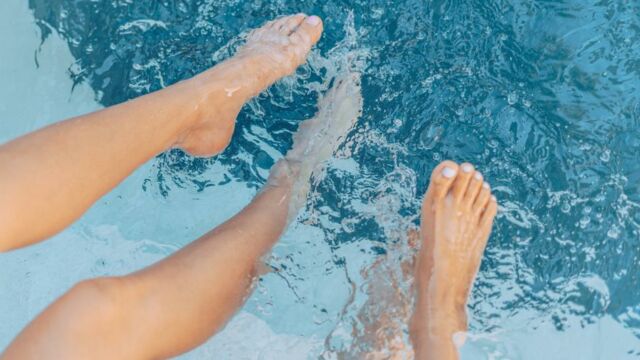Is it safe to go swimming while on your period?

Is it advisable to go for a swim when you are on your period? And are there any extra precautions to take to avoid potential mishaps from happening?
For as long as we can remember, the idea of going for a dip while on our period was a scary prospect, to put it lightly. Not only have many of us been told that it could make for a very embarrassing leakage-situation to arise, but we would be lying if, in the past, we said we hadn't thought of elaborate excuses to avoid having to go to the beach when being on our periods. After all, feeling bloated, wearing minimal clothing and being afraid of everything that could go wrong is not our idea of fun.
Discover our latest podcast
With summer fast approaching and bikini by the pool an inevitable day time activity we see ourselves partaking in, what better time than now to finally get an answer to what appears to be a topic that is flooded with misinformation. So, the question remains: Can one go swimming while on their period?
More under this adMore under this adThe short answer to this is: yes! The slightly longer answer: absolutely you can and you most definitely should. Here's why.
Leaving a bloody trail
First of all, you shouldn't have to worry about leaving blood in the pool if you're wearing a tampon or a menstrual cup. It would be extremely unlikely for this to occur but even if it does, know that pools are all chlorinated to precisely protect swimmers from all sorts of diseases that could be caught from other people's bodily fluids.
More under this adMore under this adShould you have a period mishap and actually find yourself bleeding in the water, no amount of menstrual blood would be sufficient enough to be detected as the volume of water is much too great; it would simply dilute and no one would be the wiser.
As science would have it, the moment you enter a large body of water like you would in a pool or in the sea, the water pressure can actually stop your flow temporarily.
More under this adMore under this adWhat about vaginal infections?
Although chlorinated water has been known to sometimes have an irritating effect on one's vulva and vagina (which can later on develop into a yeast infection or a bacterial vaginosis) there are ways around this.
You'll definitely want to avoid sitting around in your wet swimwear as humidity is bacteria's best friend. It is also recommended to take a shower immediately having going for a dip. If you do, however, notice burning, itching or an unusual vaginal discharge, getting that checked by a doctor is most recommended.
More under this adMore under this adSo, the take away here is to go into it prepared by using either a tampon or a menstrual cup and be extra hygienic after your swim and you should be good to go!